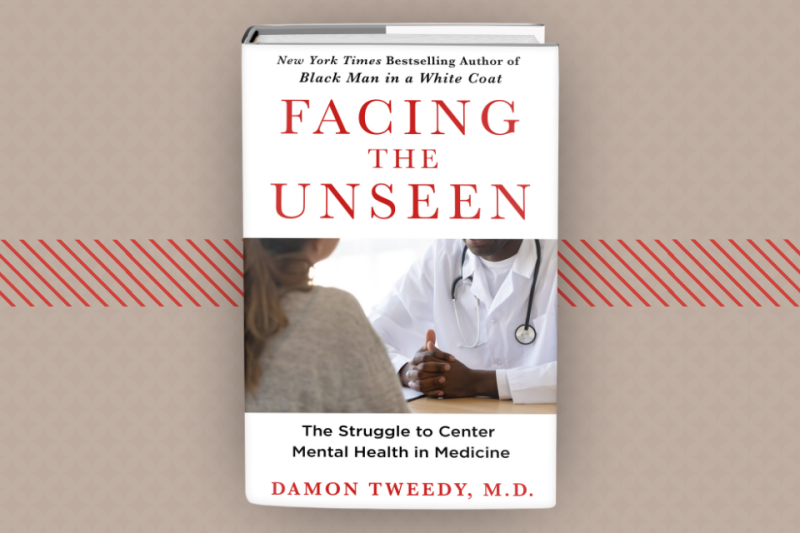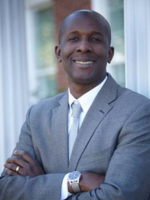
Damon Tweedy, MD, has practiced psychiatry for nearly two decades, but he wasn’t always passionate about mental health. As a medical student, he ranked his psychiatry rotation among his least favorite clinical experiences, and like many of his peers and attending physicians at the time, even looked down on the field. It wasn’t until after his first year of residency that he transitioned from cardiologist-in-training to budding psychiatrist.
In his new book, Facing the Unseen: The Struggle to Center Mental Health in Medicine, Tweedy shares his journey from his medical school years through his career as a professor of psychiatry and behavioral sciences at Duke and staff psychiatrist at the Durham Veterans Administration Health System. He weaves together patient stories, personal reflections, and conversations with experts to explore how medical culture has historically separated physical and mental health, how this dichotomy harms both patients and doctors, and how we can better integrate these two perspectives for a more holistic and effective approach to health and well-being.
The Origin Story
The idea for the book came about a few years ago when Tweedy was teaching a course about psychiatry for Duke University medical students planning to pursue other specialties. A number of students were sharing their experiences in clinical rotations at Duke and at other locations in which they felt the attending doctors weren’t sufficiently recognizing and addressing their patients’ mental health needs.

“Those conversations made me take a step back and think about who are the doctors supervising these students—a lot of them are my age or older—and what was our experience like with training in psychiatry, and our attitudes towards it? And how might that be influencing how we deal with patients and teach students?” Tweedy noted.
Psychiatry’s perceived second-class status in medicine and inadequate training experiences, often focusing primarily on patients with severe mental illness rather than those with more common mental health challenges, have left many non-psychiatrist doctors ill-equipped to address patients’ emotional needs. These factors, Tweedy says, lead not only to suboptimal outcomes for patients, but also to doctors potentially resenting their work and, sometimes, their patients.
The book is geared toward “anyone who has a stake in the problems of our current mental health system. There’s something for everyone,” said Tweedy, whether you’re a clinician, a patient, a patient’s family member or friend, a medical student, a medical educator, or a medical school leader.
Nothing Can Be Changed Until It Is Faced
The book’s title was inspired by a 1962 quote by writer and civil rights activist James Baldwin: “Not everything that is faced can be changed, but nothing can be changed until it is faced.”
Emotional challenges and mental illness are often invisible and difficult to quantify, unlike those health conditions that produce more outwardly noticeable symptoms and can be more precisely diagnosed using tools such as blood tests and MRIs. “So the challenge for us,” Tweedy explains, “is that we have to get past this idea that just because we can’t put a lab value on something or take an x-ray of it, that it isn’t real. That’s the ‘face the unseen’ part.”
“The challenge for us is that we have to get past this idea that just because we can’t put a lab value on something or take an x-ray of it, that it isn’t real. That’s the ‘face the unseen’ part.”
— Damon Tweedy, MD
Describing the connection between the quote and the book’s message, he notes that we can’t change the past or the fact that there will always be people who struggle with mental illness, but putting these struggles on par with other illnesses and acknowledging that much of what we’ve been doing hasn’t worked is key to finding more effective ways to address mental illness.
Tweedy’s Vision for Behavioral Health Care
In the book, Tweedy outlines a few changes that could positively impact the perception of mental health in the medical landscape, the accessibility of behavioral health care, and our ability to provide holistic care that addresses patients’ emotional well-being.
He recommends “exposing future doctors, nurses, and other medical providers at an earlier stage to the full array of mental health challenges—not just people in a psychiatric hospital or in crisis in an emergency room.” Historically, medical students have almost exclusively been placed in these settings in their psychiatry clerkships, which can lead to a skewed perspective about mental illness.
Secondly, Tweedy advocates for integrating behavioral health care into general medical and subspecialty clinics. When a patient has to make an appointment with another provider and travel to another clinic on a different day, follow-up can be challenging. He explains, “If you have the mental health provider in the clinic where the patient is seeing their primary care doctor or other medical specialist, it takes away some of the stigma and makes the care more accessible.” This approach, he says, has become more common in recent years, including at Duke University Health System and the Durham VA Health Care System.
“Too often, we treat the mind and the body as totally separate from the other. We have to be creative about breaking down that false divide.”
— Damon Tweedy, MD
He’d also like to see changes in the U.S. insurance system, which typically requires patients to have a psychiatric diagnosis before they receive benefits coverage for mental health services. “But the truth is that a lot of people without a specific mental illness could benefit from behavioral health counseling to help them better manage all sorts of physical health problems,” Tweedy notes. “Too often, we treat the mind and the body as totally separate from the other. We have to be creative about breaking down that false divide.”
Hope for the Future
If there’s one thing that gives Tweedy hope about the future of behavioral health care, it’s the next generation of physicians: today’s medical students. Unlike when he was in medical school, he’s noticed that students are attuned to their own mental health and open to seeking treatment, and many of them talk freely about it. They instinctively understand the importance of paying attention to mental health, the connections between physical and mental health, and the social factors that impact one’s health. “I think they’re leading us in some good directions, and we have to catch up,” he quips.
Facing the Unseen: The Struggle to Center Mental Health in Medicine is available through MacMillan Publishers. Tweedy also published the New York Times bestseller Black Man in a White Coat: A Doctor's Reflections on Race and Medicine in 2015.
Tweedy recently sat down to talk with Mary Klotman, MD, Executive Vice President for Health Affairs and Dean of the Duke University School of Medicine, about how the medical profession can address ongoing concerns about our nation’s mental health: